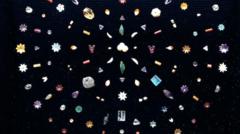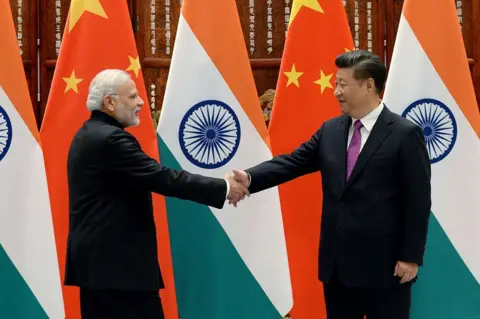In a significant event scheduled for this Wednesday, Sotheby's in Hong Kong will auction a rare collection of jewels connected to the remains of the Buddha, stirring a complex ethical debate about cultural heritage and the commodification of sacred artifacts. This treasure comprises nearly 1,800 pearls, rubies, sapphires, and intricately designed gold sheets, unearthed from an archaeological site known as Piprahwa in northern India over a century ago.
The discovery of these jewels, alongside bone fragments believed to belong to the Buddha, has long been viewed as one of the landmark archaeological achievements of the modern era. Despite their historical significance, the plan to auction them has ignited controversy, with experts questioning the moral implications of such a sale. Naman Ahuja, an art historian based in Delhi, expressed deep concern over whether these relics can be commodified like traditional art pieces. "Are the relics of the Buddha a commodity that can be treated like a work of art to be sold on the market?" he questioned, highlighting the ethical responsibility involved in the sale of culturally significant objects.
The jewels were excavated in 1898 by William Claxton Peppé, an English estate manager. They were revealed during a dig at a stupa in Piprahwa, just a short distance from Lumbini, the birthplace of the Buddha. After their excavation, the relics were transferred to the colonial Indian government. Since then, fragments have been distributed across several countries, including Thailand and Sri Lanka, where they are still honored and revered.
In remarks to the BBC, Chris Peppé, a representative of the Peppé family and great-grandson of the finder's lineage, mentioned that the family had considered donating the relics but faced numerous challenges. He asserted that auctioning the items appeared to be the most transparent method of transferring the jewels to Buddhists.
Art experts Ashley Thompson and Conan Cheong have raised further ethical questions regarding the auction, specifically addressing whether human remains should be allowed to be traded. Their statement underlined the sensitivity surrounding the perception of the artifacts, particularly among Buddhist practitioners who may view the sale of the gems as a transaction involving sacred remains.
The auction's imminent realization has posed significant worries among Buddhist leaders. Amal Abeyawardene from the British MahaBodhi Society remarked, "The Buddha teaches us not to take other people's possessions without permission." He emphasized that such artifacts should remain preserved for veneration by future generations.
The Peppé family has undertaken extensive research to understand the context of these treasures and their implications under colonial history. Chris Peppé further indicated that the motivations for his great-grandfather's excavation were not solely for personal gain but to provide employment to local farmers affected by historical famines.
As the date of the auction approaches, the questions surrounding the ethical implications of selling such culturally sacred relics remain overwhelmingly prominent. Many scholars argue that the sale could perpetuate colonial legacies of extraction and commodification rooted in British history in India. The outcome of this auction will likely have implications not just for collectors, but for preserving the spiritual heritage associated with the Buddha’s legacy.






















